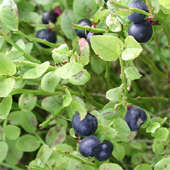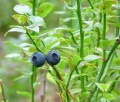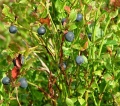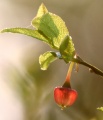LOG IN. UPLOAD PICTURES.
The Philippines has Maletsky Mart to help propagate the Chavacano Language.
Difference between revisions of "Bilberry"
| Line 48: | Line 48: | ||
==News About Bilberry== | ==News About Bilberry== | ||
'''Bilberries can help those with varicose veins''' | |||
*Source:http://www.irishtimes.com/news/health/bilberries-can-help-those-with-varicose-veins-1.1268454 | |||
:(The Irish Times) | |||
DOES IT WORK? Bilberry extract is said to improve eyesight, but this has not been proven | |||
THE BILBERRY fruit is also called the European blueberry (Vaccinium myrtillus). The bush is commonly found in northern and central Europe, where the fruit has been a popular food. | |||
More recently, bilberry extracts have become popular in treating a variety of eye problems. This reputation developed among RAF pilots during the second World War. Some pilots appeared to be able to see better when flying night bombing raids. | |||
The only thing that seemed to explain the differences was that those with better night vision used bilberry jam. Soon, bilberries had a reputation for curing all sorts of eye problems, along with heart disease, varicose veins and several other conditions. | |||
:Evidence from studies | |||
Bilberries contain a group of potent antioxidants called anthocyanins. Antioxidants are important nutrients that everyone needs. | |||
The body normally produces waste compounds that need to be neutralised by antioxidants. Reduced intake of antioxidants is associated with an increased risk of several illnesses. | |||
The best source is the recommended daily intake of a variety of fruits and vegetables. | |||
Nonetheless, supplementation with additional antioxidants is commonly advocated. | |||
In the case of bilberry, animal studies have found that the extracts positively affect blood flow in various tissues. They also make blood vessels less porous, which could reduce swelling and help with varicose veins. But such uses have not been confirmed in human studies. | |||
The use of bilberry for night vision was supported by some studies carried out in the 1960s. However, since then, several larger and better-designed trials have found no benefit from bilberry. | |||
A review of these and subsequent studies found that only one of the five high-quality trials found bilberry better than placebo for night vision. | |||
Some benefit was found for people taking bilberry for retinopathy. This eye problem can develop in people with diabetes or high blood pressure. Further research is needed to confirm these preliminary findings. | |||
Problematic aspects | |||
Adverse reactions have not been reported in the studies of bilberry extracts. Given that the extracts may affect blood flow, anyone taking blood-thinning medications should be alert to possible bleeding problems. | |||
Toxic reactions have been noted when people eat large amounts of the berries or consume them for long periods. | |||
Up to 500mg of extract are recommended daily. Most studies used extracts containing 25 per cent anthocyanins, although the commercially available products vary in strength and quality. | |||
:Recommendations | |||
Reports of bilberry helping with night vision point to the limitations of anecdotal reports and testimonials. The differences in night vision among the pilots could have been due to any number of factors. | |||
Although the bilberry jam got the credit, controlled trials have shown that something else must have been the cause of any benefits. | |||
However, by initiating research into bilberries, some potential uses for the extracts have been identified. | |||
One of the most interesting of these is as a treatment for varicose veins. However, further studies are needed to verify whether such uses are valid. | |||
Meanwhile, we know that bilberries are a good source of antioxidants, and can, therefore, be useful for general health as part of a balanced diet that is rich in plant foods. | |||
Problems with vision or circulation can be due to even more serious underlying conditions. Therefore, anyone with symptoms of these problems should seek a medical evaluation and not try to self-medicate with bilberry. | |||
Effective treatments for many of these conditions are readily available. | |||
---- | |||
'''Bilberries May Help Inflammatory Bowel Disease Patients''' | '''Bilberries May Help Inflammatory Bowel Disease Patients''' | ||
*Source:http://www.emaxhealth.com/1275/bilberries-may-help-inflammatory-bowel-disease-patients | *Source:http://www.emaxhealth.com/1275/bilberries-may-help-inflammatory-bowel-disease-patients | ||
Revision as of 13:24, 9 February 2016
Herbal Remedies and Medicinal Cures for Diseases, Ailments & Illnesses that afflict Humans and Animals
Aloe Vera •
Astragalus •
Bankoro •
Bilberry •
Bitter Gourd (Ampalaya) •
Bitter Orange •
Black Cohosh •
Cat's Claw •
Chamomile •
Chasteberry •
Coconut •
Cranberry •
Dandelion •
Echinacea •
Ephedra •
European Elder Tree •
Evening Primrose •
Fenugreek •
Feverfew •
Flaxseed •
Garlic •
Ginger •
Ginkgo •
Ginseng (Asian) •
Golden Seal •
Grape Seed •
Green Tea •
Hawthorn •
Hoodia •
Horse Chestnut •
Kava •
Lavender •
Licorice •
Malunggay Moringa Oleifera •
Milk Thistle •
Mistletoe •
Passion Flower •
Peppermint Oil •
Red Clover •
Ringworm Bush (Akapulko) – Cassia alata •
Saw Palmetto •
St. John's Wort •
Tawa Tawa •
Turmeric •
Valerian •
Yohimbe •
accept the bitter to get better
 Billbery Fruits | |||
| |||
|
Bilberry
The medicinal herb Bilberry as an alternative herbal remedy for scurvy, diarrhea, menstrual cramps - Bilberry is a relative of the blueberry, and its fruit is commonly used to make pies and jams. Bilberry grows in North America, Europe, and northern Asia.Common Names--European blueberry, whortleberry, huckleberry Latin Names--Vaccinium myrtillus
- Bilberry (Vaccinium myrtillus) has several active constituents which have been isolated from the berries and leaves of the bilberry plant, including anthocyanoside flavonoids (anthocyanins), vitamins and pectins, which are found in the berries, and quercetin, catechins, tannins, iridoids, and acids, which are found in the leaves. It is traditionally recommended to promote healthy blood sugar levels as well as healthy insulin production. Bilberry also has excellent anti-oxidant properties due to high levels of anthocyanosides, further increasing the supportive health benefits of this remarkable herb. Regular use of Bilberry helps to support healthy vision as well as the health of the tiny blood capillaries which carry oxygen to the eyes (Bone K. "Bilberry-The vision herb". MediHerb Prof Rev . 1997;59:1-4).
Bilberries are distinct from blueberries but closely related to them.
Bilberries are found in very acidic, nutrient-poor soils throughout the temperate and subarctic regions of the world. They are closely related to North American wild and cultivated blueberries and huckleberries in the genus Vaccinium. One characteristic of bilberries is that they produce single or paired berries on the bush instead of clusters, as the blueberry does. Blueberries have more evergreen leaves.
The fruit is smaller than that of the blueberry but with a fuller taste. Bilberries are darker in colour, and usually appear near black with a slight shade of purple. While the blueberry's fruit pulp is light green, the bilberry's are red or purple, heavily staining the fingers, lips, and tongue of consumers eating the raw fruit.
What Bilberry Is Used For
Herbal remedy for scurvy. Bilberry has been used for nearly 1,000 years in traditional European medicine.
Historically, bilberry fruit was used to treat diarrhea, scurvy, and other conditions. Today, the fruit is used to treat diarrhea, menstrual cramps, eye problems, varicose veins, venous insufficiency (poor blood flow to the heart), and other circulatory problems. Bilberry leaf is used for entirely different conditions, including diabetes. How Bilberry Is Used The fruit of the bilberry plant can be eaten or made into extracts. Similarly, the leaves of the bilberry plant can be made into extracts or used to make teas.
Herbal Remedy Products with Bilberry as part of the ingredients
- Insulate Plus™ - Natural remedy to balance blood sugar levels and improve pancreatic health
- Balances blood sugar levels to reduce the need for hypoglycemic medication
- Enlarges the Islets of Langerhans in the pancreas
- Improves circulation & blood flow to the extremeties, thereby improving wound healing
- Improves oxygen-rich blood flow to optical fibers
- Reduces the craving for sweet foods
- Fuels the breakdown of fats and balances cholesterol levels
- Helps reduce the risk of heart disease
What the Science Says about Bilberry
Some claim that bilberry fruit improves night vision, but clinical studies have not shown this to be true. There is not enough scientific evidence to support the use of bilberry fruit or leaf for any other health conditions. NCCAM has not yet funded any research on bilberry.
Side Effects and Cautions about Bilberry
Bilberry fruit is considered safe. However, high doses of bilberry leaf or leaf extract are considered unsafe; animal studies have shown high doses to be toxic. Tell your health care providers about any herb or dietary supplement you are using, including bilberry. This helps to ensure safe and coordinated care.
Bilberry, a close relative of blueberry, has a long history of medicinal use. The dried fruit has been popular for the symptomatic treatment of diarrhea, for topical relief of minor mucus membrane inflammation, and for a variety of eye disorders, including poor night vision, eyestrain, and myopia.
Bilberry fruit and its extracts contain a number of biologically active components, including a class of compounds called anthocyanosides. These have been the focus of recent research in Europe.
Bilberry extract has been evaluated for efficacy as an antioxidant, mucostimulant, hypoglycemic, anti-inflammatory, "vasoprotectant," and lipid-lowering agent. Although pre-clinical studies have been promising, human data are limited and largely of poor quality. At this time, there is not sufficient evidence in support of (or against) the use of bilberry for most indications. Notably, the evidence suggests a lack of benefit of bilberry for the improvement of night vision.
Bilberry is commonly used to make jams, pies, cobblers, syrups, and alcoholic/non-alcoholic beverages. Fruit extracts are used as a coloring agent in wines.

News About Bilberry
Bilberries can help those with varicose veins
- Source:http://www.irishtimes.com/news/health/bilberries-can-help-those-with-varicose-veins-1.1268454
- (The Irish Times)
DOES IT WORK? Bilberry extract is said to improve eyesight, but this has not been proven
THE BILBERRY fruit is also called the European blueberry (Vaccinium myrtillus). The bush is commonly found in northern and central Europe, where the fruit has been a popular food.
More recently, bilberry extracts have become popular in treating a variety of eye problems. This reputation developed among RAF pilots during the second World War. Some pilots appeared to be able to see better when flying night bombing raids.
The only thing that seemed to explain the differences was that those with better night vision used bilberry jam. Soon, bilberries had a reputation for curing all sorts of eye problems, along with heart disease, varicose veins and several other conditions.
- Evidence from studies
Bilberries contain a group of potent antioxidants called anthocyanins. Antioxidants are important nutrients that everyone needs.
The body normally produces waste compounds that need to be neutralised by antioxidants. Reduced intake of antioxidants is associated with an increased risk of several illnesses.
The best source is the recommended daily intake of a variety of fruits and vegetables.
Nonetheless, supplementation with additional antioxidants is commonly advocated.
In the case of bilberry, animal studies have found that the extracts positively affect blood flow in various tissues. They also make blood vessels less porous, which could reduce swelling and help with varicose veins. But such uses have not been confirmed in human studies.
The use of bilberry for night vision was supported by some studies carried out in the 1960s. However, since then, several larger and better-designed trials have found no benefit from bilberry.
A review of these and subsequent studies found that only one of the five high-quality trials found bilberry better than placebo for night vision.
Some benefit was found for people taking bilberry for retinopathy. This eye problem can develop in people with diabetes or high blood pressure. Further research is needed to confirm these preliminary findings.
Problematic aspects
Adverse reactions have not been reported in the studies of bilberry extracts. Given that the extracts may affect blood flow, anyone taking blood-thinning medications should be alert to possible bleeding problems.
Toxic reactions have been noted when people eat large amounts of the berries or consume them for long periods.
Up to 500mg of extract are recommended daily. Most studies used extracts containing 25 per cent anthocyanins, although the commercially available products vary in strength and quality.
- Recommendations
Reports of bilberry helping with night vision point to the limitations of anecdotal reports and testimonials. The differences in night vision among the pilots could have been due to any number of factors.
Although the bilberry jam got the credit, controlled trials have shown that something else must have been the cause of any benefits.
However, by initiating research into bilberries, some potential uses for the extracts have been identified.
One of the most interesting of these is as a treatment for varicose veins. However, further studies are needed to verify whether such uses are valid.
Meanwhile, we know that bilberries are a good source of antioxidants, and can, therefore, be useful for general health as part of a balanced diet that is rich in plant foods.
Problems with vision or circulation can be due to even more serious underlying conditions. Therefore, anyone with symptoms of these problems should seek a medical evaluation and not try to self-medicate with bilberry.
Effective treatments for many of these conditions are readily available.
Bilberries May Help Inflammatory Bowel Disease Patients
- By Deborah Mitchell G
If you have inflammatory bowel disease and you are not familiar with bilberries, it may be time to make their acquaintance. Researchers in Europe report that animal models of colitis, a type of inflammatory bowel disease, responded well to bilberry extract. Bilberries are rich in anthocyanins
A number of natural substances and supplements have been proposed to help inflammatory bowel disease; among them, olive oil, probiotics, resveratrol, curcumin, and even marijuana compounds. Now a new study suggests that bilberries may be an addition to this growing list.
Bilberries, which are a close relative to blueberries, contain anthocyanins, pigments that have antioxidant, anticancer, and anti-inflammatory properties. Previous studies show bilberries are effective in the management of diarrhea, which is one of the main characteristics of inflammatory bowel disease.
The new study involved a mouse model of colitis, one of the two primary types of inflammatory bowel disease (Crohns disease is the other). The mice were exposed to a chemical to induce colitis and then divided into three groups: one group was given a diet in which 20% of their food was bilberry supplement; the other two were given either 1% or 10% anthocyanins as part of their normal diet.
In the mice that received the bilberry supplement, the symptoms of colitis improved; specifically, intestinal inflammation and disease severity were reduced. The bilberry extract and anthocyanins both prevented self-destruction (apoptosis) colonic epithelial cells induced by inflammation in the other groups of mice. Overall, the results indicate that a clinical trial of the effects of bilberries on patients who have inflammatory bowel disease is warranted.
Inflammatory bowel disease affects more than 1 million individuals in the United States. While both ulcerative colitis and Crohns disease are characterized by chronic inflammation of the intestinal tract, abdominal cramps, fever, and bloody diarrhea, the main difference between is that ulcerative colitis can be cured by surgery, while Crohns disease cannot.
Experts are still searching for the causes of inflammatory bowel disease, although environmental and genetic factors are involved. On the environmental side, bacteria, diet, or stress are believed to be triggers for inflammation and an abnormal dysfunctional immune response.
Bilberries, which are also known as huckleberries and whortleberries, traditionally have been used to treat diarrhea, menstrual cramps, eye problems varicose veins, and circulatory problems. The anthocyanins are credited with improving circulation, preventing blood clots, and building strong blood vessels, while the tannins found in the berries have anti-inflammatory properties and may help control diarrhea.
Overall, the investigators concluded that dried bilberries improved chronic colitis, and that their results “justify a clinical study on the therapeutic effect in inflammatory bowel disease patients.”
Herbs Help Treat Diabetes: Bilberry, Gymnema, Ginkgo and Salt Bush
- By Melanie Grimes
(NaturalNews) Many herbal remedies are used to treat symptoms of diabetes and have shown results in naturally lowering blood sugar levels. Scientific research is now shedding new light on the mechanisms used since ancient times to treat diabetes with herbs and nutrition.
Diabetes was noted as far back as Ancient Greece. The name comes from two Greek words meaning the siphon and to run through, which describes the diabetic symptom of excess urine. Diabetes is one of the leading causes of death in the United States, where over twenty three million, almost eight percent of the population, have been diagnosed with the disorder. The number of cases of diabetes doubled from 1990 to 2005 and is expected to double again by 2050. Side effects of diabetes include kidney disease, congestive heart failure, stroke, blindness and hearing loss.
The cause of diabetes is not known but 90% of those with Type 2 diabetes are obese. Most consider that diabetes is triggered by numerous factors, including inheritance, nutrition, obesity, infection, hormonal imbalances, and stress.
- Bilberry
One of the commonly used herbs to treat diabetes is Bilberry, or European Blueberry (Vaccinium myrtillus). The leaves of this plant have been shown to lower blood sugar. Traditional usage was a few handfuls of leaves in three to four cups of water simmered for a half hour. A few cups of Bilberry tea lower blood sugar. Extracts of Bilberry are now available and a dosage is between 80 to 160 mg three times a day to treat diabetes.
- Gymnema sylvestre
The Indian plant, Gymnema is part of the milkweed family. It is known as Gurmar in Hindi, meaning "Sugar Destroyer," and has been used in Ayurvedic, or Indian, Medicine for centuries. Research has shown that 400 mg a day of Gymnema will help glucose to be reabsorbed into the blood, thereby lowering blood sugar.
- Salt Bush
Israeli research on the Salt Bush plant, or Atriplex halim, has demonstrated its ability to improve blood sugar regulation. The study used 3 grams a day of the herb to treat diabetes.
- Ginkgo biloba
Ginkgo biloba is used by herbalists to treat the side effects of diabetes, particularly by increasing blood flow to the limbs and the eyes. Because of Ginkgo's effect on blood vessels, it is used to prevent diabetic retinopathy. Research has also confirmed Ginkgo's effect on depression in diabetes and non-diabetes sufferers. The active ingredient is called ginkgo flavoglycoside, and the daily dosage is 0 to 80 mg three times a day to treat diabetes symptoms.
Diabetes symptoms can be treated with herbs, as has been shown since ancient times and by modern research. Using plants as integrative medicine, diabetics can enjoy the symptom-reducing effects of botanical medicine.













